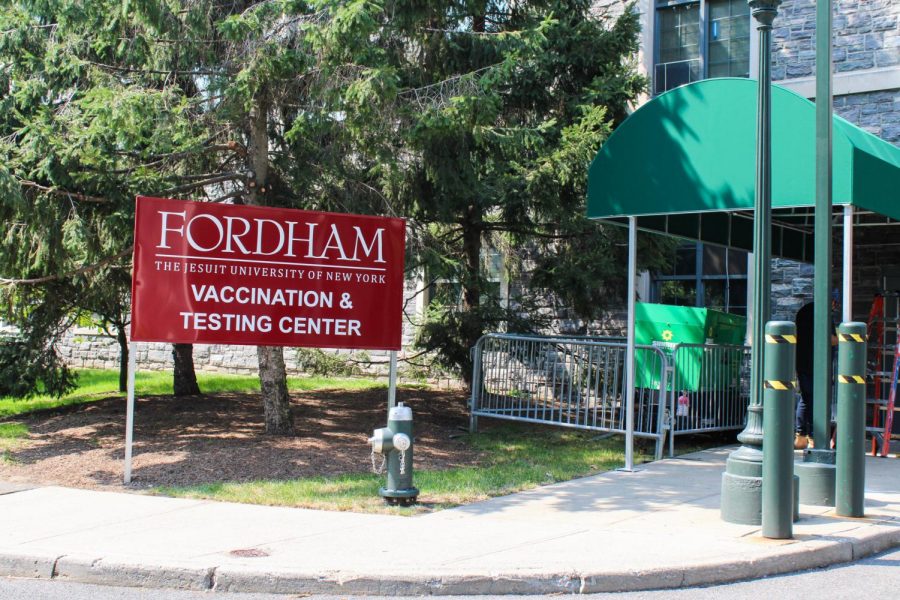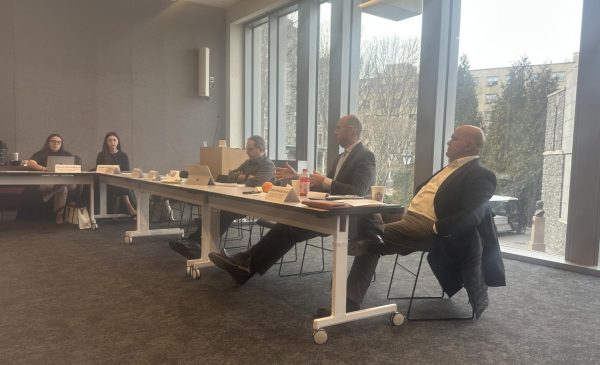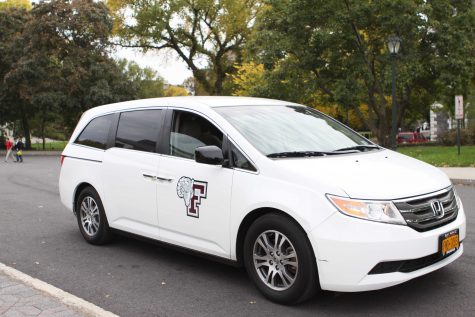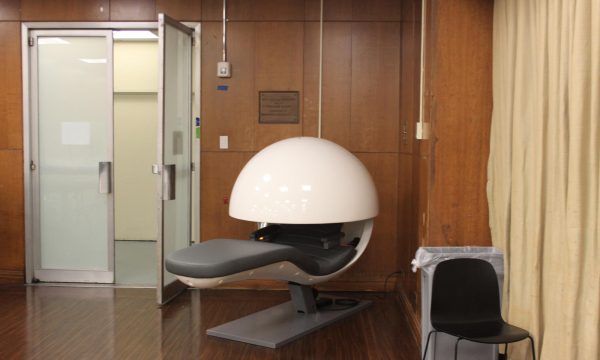Fordham Grapples with Testing and Contact Tracing Procedures
Sari Avila Franklin/The Fordham Ram
Fordham will be changing some requirements for the upcoming semester. (Courtesy of the Ram Archives)
Fordham University has made the decision this semester to do away with regular surveillance testing for vaccinated individuals, who represent the vast majority of Fordham students and employees, according to Fordham’s official website. This decision is in line with current CDC guidelines regarding regular testing of vaccinated individuals. Fordham students and faculty who are unvaccinated, however, are still subject to weekly testing.
Keith Eldredge, assistant vice president and dean of Students Services, said the university’s decision is in line with current public health policy. “We continue to adhere closely to current CDC and NYC Department of Health (DOH) guidance,” said Eldredge. “The CDC and DOH have not yet recommended broader surveillance testing and our health care professionals on and off campus recommend that we mirror the guidance.”
The Ram interviewed two professors who asked to remain anonymous to protect themselves from university retaliation. They said they felt that Fordham’s facilities administration had done a fair job of explaining the protocol when asked about the transparency of COVID-19 testing and contact-tracing procedures.
One sociology professor at Lincoln Center expressed concern for their child at home, since Fordham’s policy for parents and caregivers “only covers children who get a positive test result, not those waiting for a test result or whose classes have been moved online because of a school outbreak.”
A Rose Hill professor expressed concern for their “unvaccinated child and immunocompromised spouse” at home and dissatisfaction with the university’s choice not to continue surveillance testing for everyone. They said they would prefer if regular surveillance testing could be continued, given that there is the potential for asymptomatic transmission of the delta variant between vaccinated individuals, according to the CDC.
The question remains, though, if such protocols are effective and if they are in fact being strictly implemented on campus. Abigail Dziura, FCRH ’24, told the Ram that she recently had a student test positive in one of her classes, and explained that everyone in the class had been contact traced because her professor had not submitted a seating chart, which is strongly encouraged by administrators.
“I just felt very in the dark, confused and scared,” Dziura said.
Dziura said that Fordham’s Public Safety Office told her she needed to wait “a day or two” before being tested and was able to go to class while masked in the meantime — something she described as “a recipe for disaster” in light of the fact that she could have unknowingly been positive.
Jake Miller, FCRH ’24, agreed, saying he, too, had to wait three days until he was allowed to get tested. He feels like Fordham is “pushing in-person learning too much to really be safe.”
Students have had mixed experiences with testing on campus. Some found the experience fairly easy and straightforward while others found it slow due to the lack of people actually conducting tests and confusing messages from Fordham administrators. Dziura described her extremely confusing and difficult experience last week, both while locating the new testing center and communicating with administrators as she was given contradictory instructions on how and where to get tested by three different administrators at Fordham.
Joshua Gilbert, FCRH ’24, who was tested at the CityMD off campus, explained that he felt as if Fordham could “make things easier, simply by bringing back the testing tent near O’Hare.” Last year the large tent set up on the green space in front of O’Hare Hall provided testing to students every day of the week. He said he observed that many students are “frustrated by the inaccessibility [of] testing on campus.”
While their actual testing experiences vary somewhat, all students interviewed by the Ram felt confused about what was being asked of them after being contact-traced.
Additionally, the students interviewed were under the impression that PCR tests are free on campus and rapid tests are $35. This was the case during the fall and spring semesters of the previous academic year when students were not charged for the regular COVID-19 tests conducted on campus. The Fordham Forward FAQ section of the university’s website states that both PCR and rapid tests on campus now cost $35. “In most situations, students are charged $35 for a test and, if charged, they are given a receipt which they can submit to their insurance,” the website states. Eldredge told the Ram that students can seek free COVID-19 testing off campus at testing sites near campus.
All students interviewed agreed that COVID-19 testing for contact-traced students must be required, not simply “a series of suggestions,” as Miller put it. Students interviewed agreed that mandatory testing would make them feel much more comfortable on campus, as the delta variant is a threat to the safety and livelihood not only to Fordham students and faculty, but also the greater Bronx community.
As of Monday, Sept. 20, Marco Valera, vice president for Administration & COVID-19 Coordinator, announced updated contact tracing and testing policies. All vaccinated students and employees “should report for testing as outlined below within three to five days” after being contact-traced, according to Valera. Until they receive a negative result, these individuals must wear masks at all times on campus, including outdoors.
In his update, Valera also outlined when and where students can be tested for COVID-19 on campus this semester. Rose Hill students who have been exposed or contact-traced will be tested Monday through Friday between 10 a.m. and 2 p.m. at the shed on the northeast corner of O’Hare Hall. Rose Hill employees can receive on-campus testing Monday through Friday between 9:30 a.m. and 3 p.m. in the Coffey Field trailer. Lincoln Center students can get tested Monday and Thursdays between 10 a.m. and 3 p.m. in McMahon Room 211. Lincoln Center faculty and staff will be tested during the same times in McMahon Room 211.
“This testing is provided at no charge to anyone believed to be exposed on campus,” wrote Valera. The statement regarding billing students $35 for tests in “most situations” on Fordham’s website had not been revised to reflect Valera’s announcement as of the evening of Tuesday, Sept. 21.
Valera advised that contact-traced students and employees do not need to call Health Services before getting tested and can simply visit their campus testing sites at designated times. “All symptomatic students should isolate and contact the University Health Services for follow up,” wrote Valera. Symptomatic employees are also asked to isolate and contact their healthcare provider, as well as indicate their symptoms in VitalCheck. “They should not return to campus until cleared by their health care provider,” said Valera.
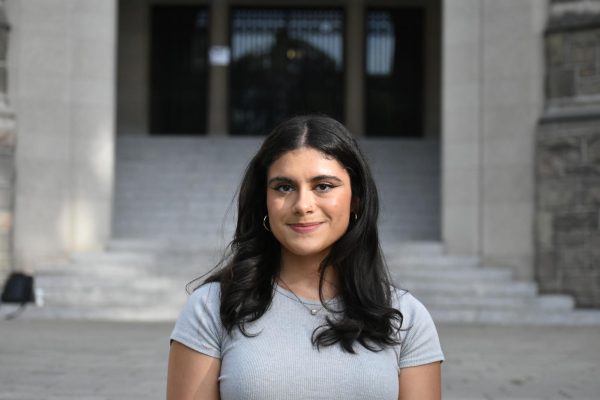
Sophia Forlenza is a senior from Brookfield, Conn. She is majoring in digital technologies and emerging media and minoring in television. She first joined...





































































































































































































